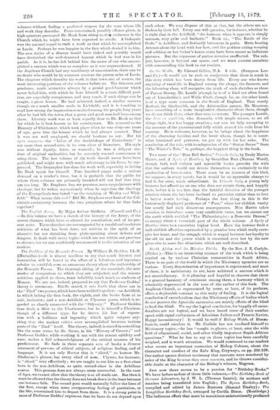The Problem of the Homeric Poems. By William D. Geddes,
LL.D. (Macmillan.)—It is almost needless to say that much interest and instruction will be found in the effort of a laborious and ingenious scholar to establish even an erroneous theory about the authorship of the Homeric Poems. The thorough sifting of the materials, the new modes of comparison to which they are subjected, and the minute criticism applied to them, must infallibly teach much to students of Homer. We are not, indeed, prepared to say that Professor Geddes' theory is erroneous. Briefly stated, it sets forth that there are in the" Iliad" two poems, which have been welded together,—an Achilleid, to which belong the first book, the eighth, and the books from xi. to xxii., inclusive ; and a non-Achilleid or Ulyssean poem, which is re- garded as closely connected with the " Odyssey." Professor Geddes thus deals a blow to the Chorizontes, but he is himself a Chorizon, though of a different type, for he draws his line of separa- tion with a boldness and ingenuity which quite surpass any- thing that the ancient critics ever accomplished between various parts of the " Iliad " itself. The theory, indeed, is stated in something like the same terms by Mr. Grote, in his " History of Greece ;" and Professor Geddes, while working it out with the utmost subtlety and care, makes a full acknowledgment of the critical acumen of his predecessor. He finds in these separate sets of books a diverse treatment of persons, of ethical subjects, of religious feeling, and of language. It is not only Hector that is "sliced," to borrow Mr. Gladstone's phrase, but every chief of note. Ulysses, for instance, is " sliced " very effectively ; we are taught to see him as a first-class hero in the non-Achillean, as quite second-class in the Achillean cantos. This process does not always seem successful. In the case of Ajax, we cannot allow that the theory is at all made out. But then it must be allowed that the theory does not break down in the least because one instance fails. The second poet would naturally follow the lines of the first, except when some overpowering feeling of patriotism, or the like, constrained him to depart from them. It is a strong point in most of Professor Geddes' argument that its facts do not depend upon
each other. We may dispose of this or that, but the others are not shaken by their fall. Every one will question, for instance, whether he, is right that in the Achilleid, "the humour, when it appears, is simply sarcasm, very grim and barbaric." Book xx., " The Battle of the Gods," is Achillean, and distinctly humorous in parts. Here, beating Artemis about the head with her bow, and the goddess sitting weeping and sobbing on her father's knees, must have been meant as ludicrous pictures. But the argument of pathos remains unaffected. The sub- ject, however, is beyond our space, and we must content ourselves with commending this book to our readers.


































 Previous page
Previous page